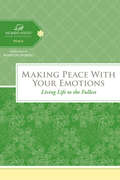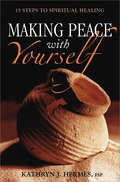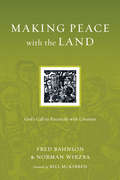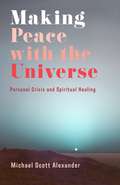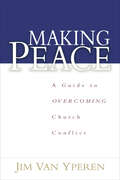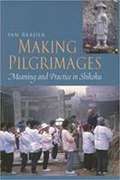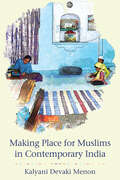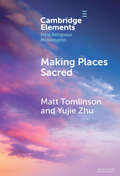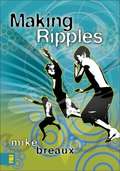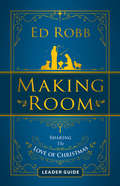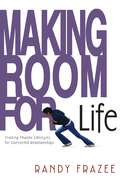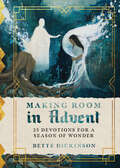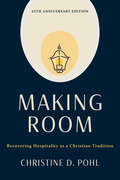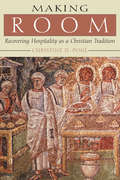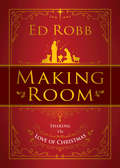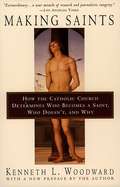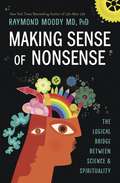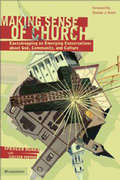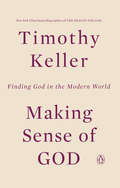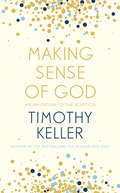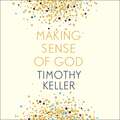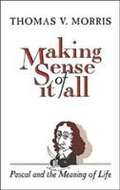- Table View
- List View
Making Peace with Your Emotions: Living Life to the Fullest (Women of Faith Study Guide Series)
by Women Of Faith"The LORD your God in your midst, The Mighty One, will save; He will rejoice over you with gladness, He will quiet you with His love, He will rejoice over you with singing." Zephaniah 3:17 (NKJV) Are our emotions an enemy to be defeated, or a gift to be enjoyed? Every one of us has been there--torn between conflicting emotions, crushed by grief, or totally overcome with joy. One moment we can be completely happy and the next we can be confused and sad. Are these emotions and feelings something we need to overcome, ignore, or just accept? Wouldn't life be easier without all the tumultuous feelings we experience? Throughout Scripture, we see God display many emotions--joy, anger, jealousy, grief. Could it be that we're emotional beings because we have been made in the image of an emotional God? Through this study, you will explore twelve Bible passages and characters that expressed raw emotion. You will feel more empowered to handle negative emotions in a healthy way, and you will have a deeper appreciation for emotions in general. You will have confidence that your emotions are not only good, but godly. Features: Twelve weeks of Bible study Questions for discussion Leader's Guide included for leading your small group study
Making Peace with Yourself
by Kathryn J. HermesThis is a guide to the deepest reality at work in our lives: God's presence in the midst of life's confusion. "This book explores the stories of people like you and me, people faced with situations that often were irreparable, people who need to make peace with themselves" -- Kathryn J. Hermes, FSP
Making Peace with the Land: God's Call to Reconcile with Creation (Resources for Reconciliation)
by Norman Wirzba Fred BahnsonGod is reconciling all things in heaven and on earth. We are alienated not only from one another, but also from the land that sustains us. Our ecosystems are increasingly damaged, and human bodies are likewise degraded. Most of us have little understanding of how our energy is derived or our food is produced, and many of our current industrialized practices are both unhealthy for our bodies and unsustainable for the planet. Agriculturalist Fred Bahnson and theologian Norman Wirzba declare that in Christ, God reconciles all bodies into a peaceful, life-promoting relationship with one another. Because human beings are incarnated in material, bodily existence, we are necessarily interdependent with plants and animals, land and sea, heaven and earth. The good news is that redemption is cosmic, with implications for agriculture and ecology, from farm to dinner table. Bahnson and Wirzba describe communities that model cooperative practices of relational life, with local food production, eucharistic eating and delight in God's provision. Reconciling with the land is a rich framework for a new way of life. Read this book to start down the path to restoring shalom and experiencing Jesus' kingdom of shared abundance, where neighbors are fed and all receive enough.
Making Peace with the Universe: Personal Crisis and Spiritual Healing
by Michael Scott AlexanderThe world’s great religious and philosophical traditions often include poignant testimonies of spiritual turmoil and healing. Following episodes of harrowing personal crisis, including addictions, periods of anxiety and panic, and reminders of mortality, these accounts then also describe pathways to consolation and resolution.In Making Peace with the Universe, Michael Scott Alexander reads diverse classic religious accounts as masterpieces of therapeutic insight. In the company of William James, Socrates, Muslim legal scholar turned mystic Hamid al-Ghazali, Chinggis Khan as described by the Daoist monk Qui Chuji, and jazz musician and Catholic convert Mary Lou Williams, Alexander traces the steps from existential crisis to psychological health. He recasts spiritual confessions as case histories of therapy, showing how they remain radical and deeply meaningful even in an age of scientific psychology. They record the therapeutic affect of spiritual experience, testifying to the achievement of psychological well-being through the cultivation of an edifying spiritual mood.Mixing scholarly learning with episodes from his own skeptical quest, Alexander demonstrates how these accounts of private terror and personal triumph offer a model of therapy through spiritual adventure. An interdisciplinary consideration of the shared terrain of religion and psychology, Making Peace with the Universe offers an innovative view of what spiritual traditions can teach us about finding meaning in the modern world.
Making Peace: A Guide to Overcoming Church Conflict
by Jim Van YperenConflict abounds in the church of Jesus Christ. Reconciliation within the body, however, will not happen with the right 'method' or 'set of principles.' In Making Peace, readers are challenged to place their church and all of its dissension under the Lordship of Jesus Christ.
Making Peace: A Guide to Overcoming Church Conflict
by Jim Van YperenConflict abounds in the church of Jesus Christ. Reconciliation within the body, however, will not happen with the right 'method' or 'set of principles.' In Making Peace, readers are challenged to place their church and all of its dissension under the Lordship of Jesus Christ.
Making Pilgrimages: Meaning and Practice in Shikoku
by Ian Reader<p>This study involves a fourteen-hundred-kilometer-long pilgrimage around Japan’s fourth largest island, Shikoku. In traveling the circuit of the eighty-eight Buddhist temples that make up the route, pilgrims make their journey together with Kôbô Daishi (774–835), the holy miracle-working figure who is at the heart of the pilgrimage. <p>Once seen as a marginal practice, recent media portrayal of the pilgrimage as a symbol of Japanese cultural heritage has greatly increased the number of participants, both Japanese and foreign. In this absorbing look at the nature of the pilgrimage, Ian Reader examines contemporary practices and beliefs in the context of historical development, taking into account theoretical considerations of pilgrimage as a mode of activity and revealing how pilgrimages such as Shikoku may change in nature over the centuries.</p>
Making Place for Muslims in Contemporary India
by Kalyani Devaki MenonMaking Place for Muslims in Contemporary India looks at how religion provides an arena to make place and challenge the majoritarian, exclusionary, and introverted tendencies of contemporary India.Places do not simply exist. They are made and remade by the acts of individuals and communities at particular historical moments. In India today, the place for Muslims is shrinking as the revanchist Hindu Right increasingly realizes its vision of a Hindu nation. Religion enables Muslims to re-envision India as a different kind of place, one to which they unquestionably belong. Analyzing the religious narratives, practices, and constructions of religious subjectivity of diverse groups of Muslims in Old Delhi, Kalyani Devaki Menon reveals the ways in which Muslims variously contest the insular and singular understandings of nation that dominate the sociopolitical landscape of the country and make place for themselves. Menon shows how religion is concerned not just with the divine and transcendental but also with the anxieties and aspirations of people living amid violence, exclusion, and differential citizenship. Ultimately, Making Place for Muslims in Contemporary India allows us to understand religious acts, narratives, and constructions of self and belonging as material forces, as forms of the political that can make room for individuals, communities, and alternative imaginings in a world besieged by increasingly xenophobic understandings of nation and place.
Making Places Sacred: New Articulations of Place and Power (Elements in New Religious Movements)
by Matt Tomlinson Yujie ZhuAlthough claims to sacredness are often linked to the power of a distant past, the work of making places sacred is creative, novel, renewable, and reversible. This Element highlights how sacred space is newly made. It is often associated with blood, death, and geographic anomalies, yet no single feature determines sacred associations. People make space sacred by connecting with 'extrahuman' figures – the ancestors, spirits, and gods that people attempt to interact with in every society. These connections can be concentrated in people's bodies, yet bodies are particularly vulnerable to loss. The Element also examines the multidimensional and multisensory dimensions of sacred space, which can be made almost anywhere, including online, but can also be unmade. Unmaking sacred space can entail new sacralization. New and minority religions in particular provide excellent sites for studying sacredness as a value, raising the reliably productive question: sacred for whom?
Making Religion Safe for Democracy
by J. Judd OwenDoes the toleration of liberal democratic society mean that religious faiths are left substantively intact, so long as they respect the rights of others? Or do liberal principles presuppose a deeper transformation of religion? Does life in democratic society itself transform religion? In Making Religion Safe for Democracy, J. Judd Owen explores these questions by tracing a neglected strand of Enlightenment political thought that presents a surprisingly unified reinterpretation of Christianity by Thomas Hobbes, John Locke, and Thomas Jefferson. Owen then turns to Alexis de Tocqueville's analysis of the effects of democracy on religion in the early United States. Tocqueville finds a religion transformed by democracy in a way that bears a striking resemblance to what the Enlightenment thinkers sought, while offering a fundamentally different interpretation of what is at stake in that transformation. Making Religion Safe for Democracy offers a novel framework for understanding the ambiguous status of religion in modern democratic society.
Making Ripples
by Mike BreauxMike Breaux doesn’t do life halfway—maybe that’s why he thinks a "cannonball” is the only suitable entry into a swimming pool. “Deep down, I think all of us sense we were put on this planet to do something significant—to touch someone’s life; to do some good.” Again and again, he’s seen the cannonball approach make that happen. “Water goes flying everywhere! The ripples go out, hit the side, and come back in.” In this book, Breaux shares the concept of creating “ripples”—where a life touches a life, which touches a life, which touches a life.
Making Room Leader Guide: Sharing the Love of Christmas (Making Room)
by Ed RobbOften our Advent preparations have an inward focus as we prepare for the significance of God breaking into our world through the birth of the Christ child. But in a closer examination of the Advent story, we quickly learn that the focus of the coming of the newborn king is outward.In this book and Advent study, Dr. Ed Robb explores the warmth of welcome at Christmas following interactions with Mary and Joseph, the shepherds, and the magi. Just as Jesus made room in God’s kingdom for a host of people that society wanted to leave on the margins, beginning with the appearance of the shepherds, we too should be asking ourselves who we can make room for this Christmas.Perhaps it is to the people in your community, or the newly immigrated family in town that doesn’t speak your language. Or maybe it’s the next-door neighbor who just settled in from yet another corporate move? The story of Christ’s birth encourages us to widen our borders and increase our sense of community—and make room for others.The Leader Guide contains everything needed to guide a group through the four-week study including session plans, activities, and discussion questions, as well as multiple format options.
Making Room for Life: Trading Chaotic Lifestyles for Connected Relationships
by Randy FrazeeWhat if you could get all your work done by 6:00 p.m.? Eat dinner with your family every night? Form deep, satisfying relationships? Naturally blend the world of church with your everyday life? Spend hours a week on your hobbies?You can! Making Room for Life reveals how to make all of these things a reality. Not by working faster or having more gadgets, but by simply choosing a lifestyle of conversation, and community over accumulation.Randy Frazee's practical, motivating insights call you back to the kind of relationships and life rhythms you were created to enjoy. In Making Room for Life, Frazee shows you how and why it's so important to balance work and play, establish healthy boundaries, deal with children's activities and homework, bring Jesus to your neighbors, and build authentic bonds with a circle of close friends. Share these insights with those around you and help usher in an amazing transformation: your life and the lives of others blooming, in the midst of the chaos and fragmentation of today's culture, into communities of purpose and peace.
Making Room in Advent: 25 Devotions for a Season of Wonder
by Bette DickinsonPreparation for the Christmas season can often feel busy and frantic, but it doesn't have to be this way.Making Room in AdventThe unfolding of God's plan often happens in unlikely spaces, both in Scripture and in our own lives. Join Bette Dickinson as she moves through the story of Jesus' birth and the stories of the many people that were part of the journey. Each page is filled with an original painting that will fill you with hope and wonder during the Advent season. The twenty-five devotionals offer spiritual practices, breath prayers, and reflection questions that allow you to truly make room for God's work in your life, your community, and the world.
Making Room, 25th anniversary edition: Recovering Hospitality as a Christian Tradition
by Christine D. PohlHospitality is crucial to Christian ministry. To the early Christians, hospitality was central to the gospel mission. This hospitality did not consist of entertaining neighbors, but welcoming the stranger, especially those who could not return the favor. Yet despite urgent need, hospitality has fallen by the wayside. Christine Pohl&’s classic work, Making Room, first spoke to this issue in 1999. And it is just as relevant today, with the refugee crisis, the rise in homelessness, and growing loneliness and isolation. This revitalized edition, with a new foreword and afterword by the author, introduces the theology of hospitality to a new generation. Pohl combines rich biblical and historical research with experience in contemporary Christian communities, including the Catholic Worker, L&’Abri, Good Works, Inc., and others. Pragmatic and thoughtful, Pohl deals frankly with both the blessings and the boundaries of hospitality. Readers will find a wealth of wisdom to revive authentic hospitality in their ministry.
Making Room: Recovering Hospitality as a Christian Tradition
by Christine D. PohlAlthough hospitality was central to Christian identity and practice in earlier centuries, our generation knows little about its life-giving character. Making Room revisits the Christian foundations of welcoming strangers and explores the necessity, difficulty, and blessing of hospitality today.Combining rich biblical and historical research with extensive exposure to contemporary Christian communities -- the Catholic Worker, L'Abri, L'Arche, and others -- this book shows how understanding the key features of hospitality can better equip us to faithfully carry out the practical call of the gospel.
Making Room: Sharing the Love of Christmas (Making Room)
by Ed RobbOften our Advent preparations have an inward focus as we prepare for the significance of God breaking into our world through the birth of the Christ child. But in a closer examination of the Advent story, we quickly learn that the focus of the coming of the newborn king is outward.In this book and Advent study, Dr. Ed Robb explores the warmth of welcome at Christmas following interactions with Mary and Joseph, the shepherds, and the magi. Just as Jesus made room in God’s kingdom for a host of people that society wanted to leave on the margins, beginning with the appearance of the shepherds, we too should be asking ourselves who we can make room for this Christmas.Perhaps it is to the people in your community, or the newly immigrated family in town that doesn’t speak your language. Or maybe it’s the next-door neighbor who just settled in from yet another corporate move? The story of Christ’s birth encourages us to widen our borders and increase our sense of community—and make room for others.Additional components for a four-week study include a comprehensive Leader Guide.
Making Saints: How The Catholic Church Determines Who Becomes A Saint, Who Doesn'T, And Why
by Kenneth L. WoodwardFrom inside the Vatican, the book that became a modern classic on sainthood in the Catholic Church.Working from church documents, Kenneth Woodward shows how saint-makers decide who is worthy of the church's highest honor. He describes the investigations into lives of candidates, explains how claims for miracles are approved or rejected, and reveals the role politics -- papal and secular -- plays in the ultimate decision. From his examination of such controversial candidates as Archbishop Oscar Romero of El Salvador and Edith Stein, a Jewish philosopher who became a nun and was gassed at Auschwitz, to his insights into the changes Pope John Paul II has instituted, Woodward opens the door on a 2,000-year-old tradition.
Making Sense Of Nonsense: The Logical Bridge Between Science And Spirituality
by Raymond MoodyWhat do the whimsical writings of Dr. Seuss have in common with near-death experiences? The answer is that nonsense writing and spiritual experiences seem to defy all logic and yet they both can make a powerful personal impact. In this book, New York Times bestselling author Dr. Raymond Moody shares the groundbreaking results of five decades of research into the philosophy of nonsense, revealing dynamic new perspectives on language, logic, and the mystical side of life. Explore the meaningful feelings that accompany nonsense language and learn how engaging with nonsense can help you on your own spiritual path. Discover how nonsense transcends classical logic, opening the doorway to new spiritual and philosophical breakthroughs. With dozens of examples from literature, comedy, music, and the history of religion, this book presents a unique new approach to the mysteries of the human spirit.
Making Sense of Church
by Colleen Pepper Spencer BurkeSamplings of online discussions about God, truth, and church—from theOoze.com Our culture is rapidly changing and people are searching for new models and paradigms to find meaning in their lives. As in all transitional periods, this search takes place in grass-roots conversations where the “new” is taking form. No other place so uniquely captures this struggle more than the message boards at theOoze.com, the premier melting pot of emerging spiritual conversation. Making Sense of Church is a snapshot of this “community conversation” as it tries to make sense of God in the emerging worldview. It represents a gathering of individuals with different points of view, theologies, life contexts, and feelings. Author Spencer Burke, creator of theOoze.com, provides the framework writing for each chapter and acts as a “guide” to the accompanying e-mail postings that supplement the chapters. Subjects discussed include: • Authentic Community • Experiential Worship • The Internet and God • Art as a Vehicle for Communicating Truth • Spirituality and Sexuality • What Is the Church? • What Is Postmodernism?
Making Sense of God: An Invitation To The Skeptical
by Timothy KellerWe live in an age of skepticism. Our society places such faith in empirical reason, historical progress, and heartfelt emotion that it's easy to wonder: Why should anyone believe in Christianity? What role can faith and religion play in our modern lives? In this thoughtful and inspiring new book, pastor and New York Times bestselling author Timothy Keller invites skeptics to consider that Christianity is more relevant now than ever. As human beings, we cannot live without meaning, satisfaction, freedom, identity, justice, and hope. Christianity provides us with unsurpassed resources to meet these needs. Written for both the ardent believer and the skeptic, Making Sense of God shines a light on the profound value and importance of Christianity in our lives.From the Hardcover edition.
Making Sense of God: An Invitation to the Sceptical
by Timothy KellerWe live in an age of scepticism. Our society places such faith in empirical reason, historical progress, and heartfelt emotion that it's easy to wonder: why should anyone believe in Christianity? What role can faith and religion play in our modern lives? In this thoughtful and inspiring book, pastor and New York Times bestselling author Timothy Keller invites sceptics to consider that Christianity is as relevant now as ever. As human beings, we cannot live without meaning, satisfaction, freedom, identity, justice and hope - and Christianity provides us with unsurpassed resources to meet all these needs. Written for both sceptic and believer, Making Sense of God shines a light on the profound value and importance of Christianity in our lives.
Making Sense of God: An Invitation to the Sceptical
by Timothy KellerWe live in an age of scepticism. Our society places such faith in empirical reason, historical progress, and heartfelt emotion that it's easy to wonder: why should anyone believe in Christianity? What role can faith and religion play in our modern lives? In this thoughtful and inspiring book, pastor and New York Times bestselling author Timothy Keller invites sceptics to consider that Christianity is as relevant now as ever. As human beings, we cannot live without meaning, satisfaction, freedom, identity, justice and hope - and Christianity provides us with unsurpassed resources to meet all these needs. Written for both sceptic and believer, Making Sense of God shines a light on the profound value and importance of Christianity in our lives.
Making Sense of God: An Invitation to the Sceptical
by Timothy KellerWe are unavoidably hope-based creatures. Imagine two women given the same boring task to do eight hours a day in the same conditions - but you tell one woman she will be paid £15,000 for a year of this work, and you tell the other that she will be paid £15 million. Each woman in identical circumstances will be experiencing those circumstances in completely different ways, because what we believe about the future determines how we live in the present. In this dynamic new book, New York pastor and bestselling author Tim Keller explores the biblical understanding of hope. A profound grasp of what we are hopeful for, he argues, can re-energise and transform us personally, can help us face death, can influence our community practices with regard to sex, money and power - and even be applied globally, to renew our culture.
Making Sense of It All: Pascal and the Meaning of Life
by Thomas V. Morris'Pascal's Pensees--Thoughts--are notes that Pascal might have organized into a book if he had not died so early. Morris here gives us a book organized out of some of those thoughts. . . This is a Pascalian book filled with a passion for life and for finding the sense of life as it actually comes to us. In Pascal, and now in Morris, we can hear a philosophical voice that calls up our own deep longing and that invites us to an everlasting love. ' - George I. Mavrodes, University of Michigan
